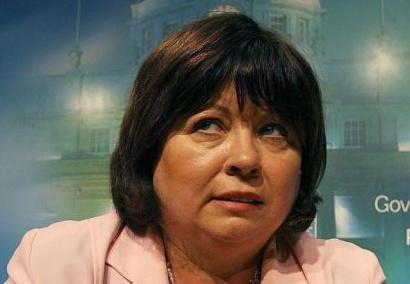Harney did great harm to health service

Mary Harney's reign as minister was driven by a philosophy that promoted inequality, writes Sara Burke.
Mary Harney has done great harm to the Irish people. Even before she took on the health ministry, PD ideology (under her leadership) has had a disproportionate impact on government economic and social policy. Their agenda has caused particular destruction since 2000 when the PDs began to meddle with health policy and from 2004 when Mary Harney became Minister for Health.
For the last decade, the lethal recipe of Fianna Fáil's high, but ineffective, public spending and the PDs' low-tax policies contributed to the economic mess we are now in. And although the tax base was driven down and public spending increased, Irish social spending over the past 13½ years is still close to the bottom of OECD averages. There is a direct relationship between levels of social spending and health status and between poverty and health.
With hindsight, policy under Harney as Tánaiste and PD leader will be shown as harmful to Irish people's physical and psychological health and to have bolstered a growing gap between rich and poor. Each year, 5,000 Irish people die prematurely because of the income inequality perpetuated by this Government. It is not known how many people die prematurely due to the systemic inequality in the health system. Not to mind how long it takes public patients to get into the system.
Even before Mary Harney became Minister for Health, the PDs were putting their stamp on Irish health policy. The rejection of a common waiting list for all patients in public hospitals was heavily influenced by Harney's position at the cabinet table in the run-up to the publication of the health strategy in 2001. This directly contributed to the continuation of the two-tier system of hospital care.
The National Treatment Purchase Fund was another coalition compromise to the PDs in the run-up to the health strategy launch. The changes to the Finance Act in 2001 and 2002 introduced by then Minister for Finance Charlie McCreevy led to a multiplication of beds in for-profit hospitals and nursing homes. These small, unpublicised modifications were directly in line with the PD policy of incentivising developers to enter the healthcare "market" through generous tax breaks. Their developments were unplanned and unregulated and have resulted in the abuse of patients.
There is no doubt that Harney opted to go to the Department of Health 6½ years ago with the conviction that she could reform the health system. However well-intended, she made fatal mistakes along the way.
Her first error was to drive through the establishment of the HSE in January 2005. Everyone close to the health system knew the HSE was not ready to go "live". It had an ex-banker as acting chief executive, and it had no clear plan, the structure was flawed and the strategy was without vision.
Although Harney inherited the plans from Micheál Martin, she drove them through. She also oversaw the last-minute deal that was done with the unions which ensured nobody from the old health boards lost their jobs despite the logic that the amalgamation of dozens of health agencies into one should bring about rationalisation, not duplication, of managerial posts.
The Health Act, which established the HSE, considerably changed the roles of the Department of Health as many of its prior responsibilities were handed over to the HSE. Yet six years on, the Department of Health remains a dysfunctional organisation, criticised by the Government's own reports.
The long-fought negotiation of the consultants' contract is another of Harney's most high-profile "reforms". While the new contract allows for longer hours and team working, it further enshrines the two-tiered nature of the public hospital system and overpays consultants, 70 per cent of whom continue to practise privately and publicly.
Harney can and will get credit for the improvement in cancer care. Taking cancer care out of 30 unsafe hospitals and centralising it into eight specialist centres is an achievement. National breast and cervical cancer screening as well as the HPV vaccine and planned colorectal screening are also to her credit.
But fundamental to Harney's reform is her philosophy. Speaking at a conference last April, she admitted she was "a fan of co-payments" ie, sharing the cost between the State and the patient. And she stands by her word. Despite all the data against them, Harney has overseen the introduction of charges for prescriptions for people with medical cards. And the so-called Fair Deal for nursing home care is another example of making people pay more for services they were previously entitled to for free or with a minimum charge.
In both her role as Tánaiste and as Minister for Health over the last 13 years, Mary Harney has been an essential cog of a Government that has failed miserably. The only redeeming aspect in the appointment of Mary Coughlan as "caretaker" in the Department of Health is that she won't have the time nor the wherewithal to do more damage.
